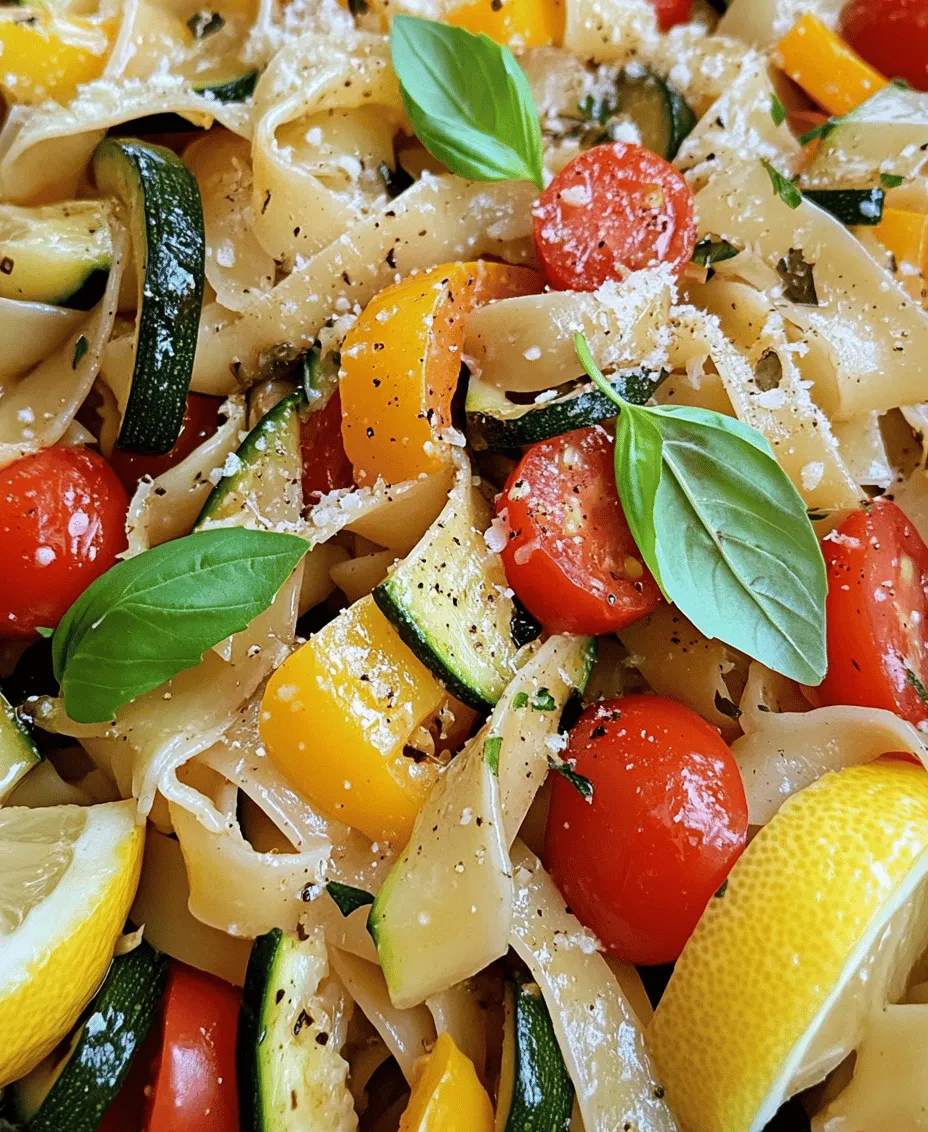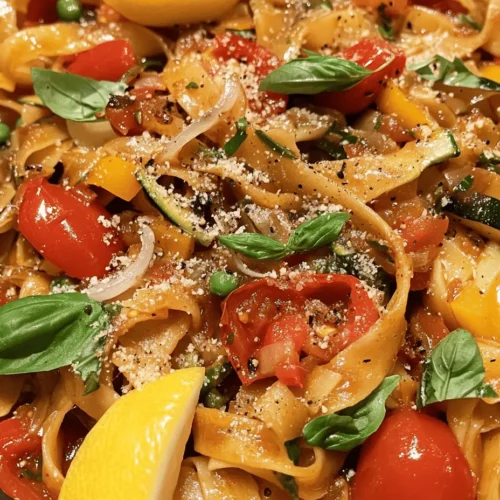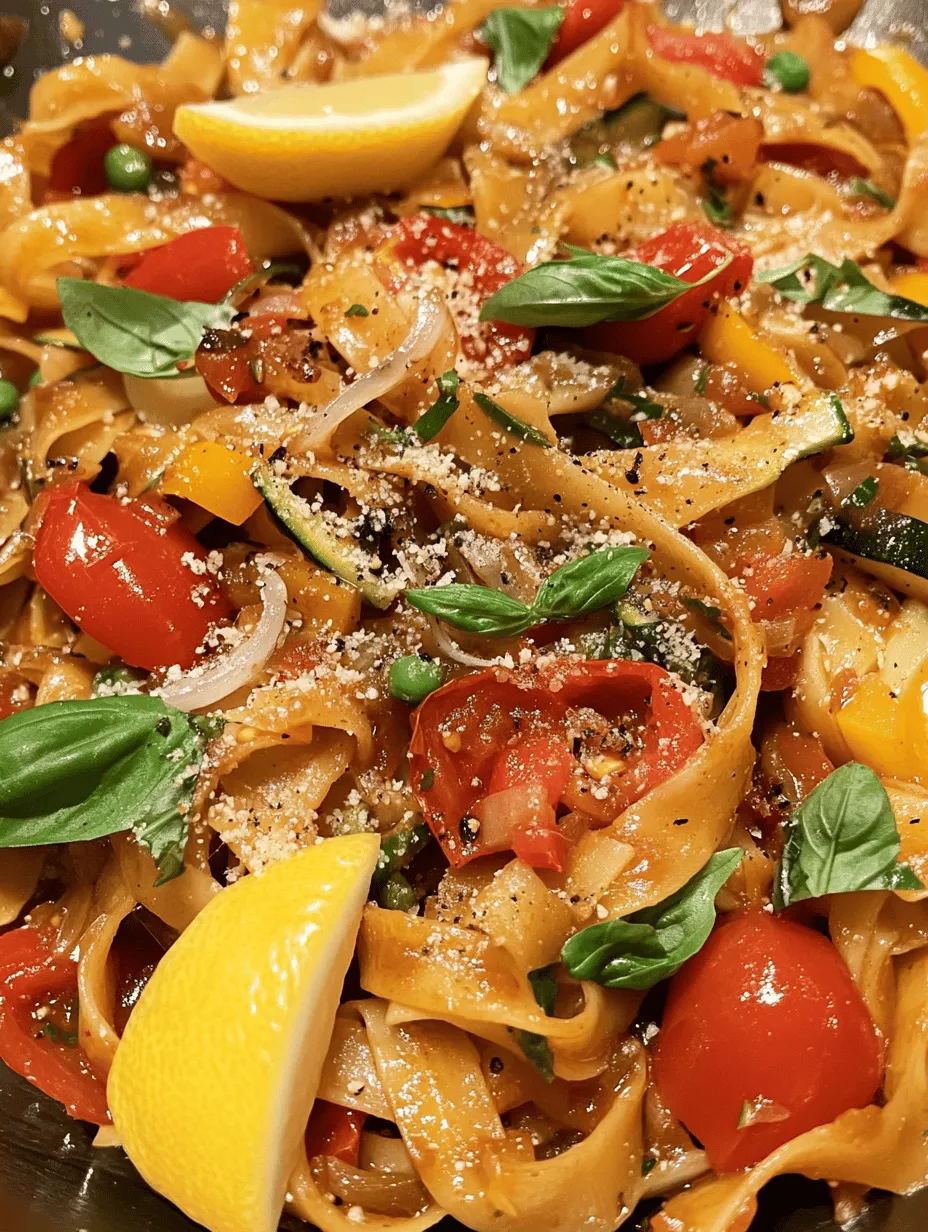Introduction
Welcome to a delightful culinary adventure featuring a dish that marries the traditional charm of Italian cuisine with an unexpected twist—Italian Drunken Noodles. This recipe celebrates the fusion of flavors, creating a vibrant, hearty meal that is sure to please any palate. With its combination of wide rice noodles, colorful vegetables, aromatic herbs, and the rich depth of red wine, this dish transforms the typical noodle experience into something truly special.
Imagine twirling your fork around tender, al dente rice noodles, each bite infused with the robust flavors of garlic, onion, and fresh basil, all while the splash of red wine adds a unique warmth to the dish. Topped with a sprinkle of Parmesan cheese, Italian Drunken Noodles are not just a meal; they are an experience that invites you to savor the moment.
This recipe is incredibly versatile—perfect for weeknight dinners when you need something quick yet satisfying, or for special occasions when you want to impress your guests with a dish that is both comforting and elegant. As we guide you through the process of crafting this delightful dish, you’ll discover that making Italian Drunken Noodles is not only easy but also a fantastic way to showcase the versatility of noodles beyond the usual stir-fry. So, roll up your sleeves and prepare to dive into this delicious culinary journey!
Understanding the Ingredients
To create the perfect bowl of Italian Drunken Noodles, it is essential to understand the role of each ingredient in the dish. Each component contributes to the overall flavor and texture, making your meal not only delicious but also nutritious.
Wide Rice Noodles: The Foundation of Flavor
At the heart of this dish are wide rice noodles, which serve as the perfect base. These noodles are known for their chewy texture and ability to absorb flavors, making them an ideal choice for this recipe. When cooked properly, wide rice noodles offer a satisfying mouthfeel that pairs beautifully with the accompanying ingredients.
The key to achieving the best texture is cooking the noodles to an al dente consistency, which means they should be firm to the bite but not hard. This texture allows the noodles to hold up against the sauce and other ingredients without becoming mushy. Whether you choose to use fresh or dried rice noodles, be sure to follow the package instructions for cooking times closely, and don’t forget to rinse them under cold water after boiling to stop the cooking process.
The Role of Olive Oil in Cooking
Olive oil is a staple in Italian cooking and plays a critical role in this recipe. Not only does it provide a rich flavor, but it also offers numerous health benefits, including heart-healthy fats and antioxidants. When used in the sautéing process, olive oil helps to create a luscious base for the dish, allowing the flavors of garlic and onion to meld beautifully.
When selecting olive oil, look for extra virgin olive oil, which is made from the first cold pressing of olives and retains the highest quality and flavor. Its fruity and peppery notes enhance the overall taste of the dish, while its ability to withstand medium-high heat makes it perfect for sautéing the aromatics.
Aromatics: Garlic and Onion
No Italian dish would be complete without the classic flavor base of garlic and onion. These aromatics are essential in building the depth of flavor that characterizes Italian cuisine. Garlic adds a pungent, savory note, while onions provide sweetness and complexity.
When preparing these ingredients, opt for fresh, high-quality produce. Choose firm, unblemished onions and plump garlic bulbs. To prepare, mince the garlic and chop the onion into small, even pieces to ensure they cook uniformly. Sautéing them together in olive oil releases their natural flavors, creating a fragrant foundation for your Italian Drunken Noodles.
Colorful Vegetables: Bell Pepper, Zucchini, and Cherry Tomatoes
Adding a medley of colorful vegetables not only enhances the visual appeal of your dish but also boosts its nutritional value. In this recipe, bell peppers, zucchini, and cherry tomatoes provide a delightful crunch and bright flavors.
Bell peppers are rich in vitamins A and C, while zucchini adds a mild sweetness and a good source of hydration. Cherry tomatoes burst with juicy flavor and offer a touch of acidity that balances the richness of the other ingredients. When preparing these vegetables, aim for uniform sizes to ensure even cooking. Slice the bell peppers into thin strips, cut the zucchini into half-moons, and halve the cherry tomatoes to allow their juices to mingle with the sauce.
Fresh Herbs: The Power of Basil
Fresh herbs are the soul of Italian cuisine, and basil shines as the star in this dish. Known for its aromatic, slightly sweet flavor, fresh basil elevates Italian Drunken Noodles, infusing the dish with a fresh, garden-like quality.
When selecting basil, look for vibrant green leaves that are fragrant and free of blemishes. To prepare, simply wash the leaves gently and pat them dry. For this recipe, you can either tear the leaves by hand to release their essential oils or chop them finely for a more pronounced flavor throughout the dish. Adding basil at the end of cooking preserves its bright flavor and color, making it a perfect finishing touch.
The Splash of Red Wine
One of the key components that sets Italian Drunken Noodles apart is the addition of red wine, which adds a layer of depth and complexity to the dish. The acidity from the wine helps to balance the richness of the olive oil and cheese while enhancing the overall flavor profile.
When choosing a wine for cooking, opt for a dry red wine, such as Chianti or Merlot. These wines have robust flavors that complement the ingredients without overpowering them. Remember, it’s essential to use a wine that you would enjoy drinking, as the flavors will concentrate during cooking. A splash of red wine towards the end of cooking will create a beautifully infused sauce that clings to the noodles.
Parmesan Cheese: A Creamy Finish
Finally, no Italian dish is complete without cheese, and Parmesan is the perfect choice for this recipe. This hard, aged cheese adds a nutty, salty flavor that enhances the overall taste of Italian Drunken Noodles.
When using Parmesan, freshly grated cheese is always preferable to pre-packaged varieties, as it melts more easily and offers a superior flavor. To get the best results, add the cheese just before serving, allowing it to melt slightly into the warm noodles, creating a creamy, indulgent finish.
Step-by-Step Recipe Guide
Now that we’ve explored the essential ingredients that make up Italian Drunken Noodles, it’s time to dive into the preparation. Each step is designed to ensure that you achieve the best flavor and texture, resulting in a dish that will impress your family and friends.
Preparing the Rice Noodles
The first step in making Italian Drunken Noodles is to prepare the rice noodles, which serve as the foundation of this flavorful dish. Here’s how to cook them perfectly:
1. Boil Water: Start by bringing a large pot of water to a rolling boil. Make sure there is enough water to allow the noodles to move freely as they cook.
2. Add Noodles: Once the water is boiling, add the wide rice noodles. If you’re using dried noodles, refer to the package instructions for the recommended cooking time, usually between 5-7 minutes.
3. Stir Occasionally: Gently stir the noodles occasionally to prevent them from sticking together.
4. Check for Doneness: Taste a noodle a minute or two before the suggested cooking time to check for doneness. The goal is to achieve an al dente texture, meaning the noodles should be cooked through but still firm to the bite.
5. Drain and Rinse: Once the noodles are cooked to perfection, drain them in a colander and rinse them under cold running water. This step stops the cooking process and removes excess starch, preventing the noodles from becoming sticky.
6. Set Aside: Set the rinsed noodles aside while you prepare the rest of the dish.
Sautéing Aromatics for Maximum Flavor
With the rice noodles prepared, it’s time to build the flavor base for your Italian Drunken Noodles. Follow these steps to sauté the aromatics:
1. Heat Olive Oil: In a large skillet or wok, heat a generous drizzle of extra virgin olive oil over medium heat. Allow the oil to warm up for a minute until it shimmers.
2. Add Garlic and Onion: Once the oil is hot, add the minced garlic and chopped onion to the skillet. Sauté for about 2-3 minutes, stirring frequently, until the onion becomes translucent and the garlic is fragrant—be careful not to let the garlic burn, as it can turn bitter.
3. Increase the Heat: If you want to enhance the flavors even further, increase the heat slightly and allow the garlic and onion to caramelize for another minute.
4. Add Vegetables: Next, add the sliced bell peppers, zucchini, and halved cherry tomatoes to the skillet. Toss the vegetables in the aromatic mixture, allowing them to cook for about 5-7 minutes or until they start to soften. The vibrant colors will brighten up your dish, making it visually appealing.
5. Season with Salt and Pepper: As the vegetables cook, season them with a pinch of salt and freshly cracked black pepper. This will help to bring out their natural flavors, making them even more delicious.
By carefully sautéing the aromatics and vegetables, you set the stage for a flavorful and satisfying dish that embodies the spirit of Italian cuisine. In the next section, we will introduce the red wine and finish crafting this delightful recipe. Stay tuned to learn how to bring all the elements together to create a dish that will tantalize your taste buds and impress your dinner guests!

Techniques for Achieving the Right Consistency and Flavor in Garlic and Onion
When preparing Italian Drunken Noodles, achieving the perfect balance of flavor and texture starts with the foundational ingredients: garlic and onion. To enhance their natural sweetness and ensure they create a robust base for your dish, consider the following techniques:
1. Sautéing: Begin by heating olive oil in a large skillet over medium heat. Add finely chopped onions first, as they take longer to caramelize. Stir frequently to prevent burning. After about 4-5 minutes, add minced garlic. Garlic cooks faster, so it should only be added once the onions are translucent and slightly golden. This technique allows the flavors to meld together beautifully while preventing the garlic from becoming bitter.
2. Achieving the Right Consistency: You’ll want the garlic and onion mixture to reach a soft, golden-brown color without being overly crispy. This caramelization process enhances the sweetness and depth of flavor essential for your sauce. If you notice the mixture browning too quickly, reduce the heat to low and continue to stir.
The Importance of Heat Control During Sautéing
Heat control is paramount in sautéing garlic and onion. Too high of a temperature can lead to burnt ingredients, while too low may not provide the desired caramelization. Here are some tips for maintaining the right temperature:
– Monitor Your Heat: Start at medium heat and adjust as necessary. A key indicator that your pan is too hot is smoke. If you see smoke, reduce the heat immediately.
– Use a Heavy-Bottomed Pan: A heavy skillet distributes heat evenly, allowing for better control during cooking. Non-stick pans can also work well but ensure they are suitable for high-heat cooking.
– Stir Frequently: This not only prevents burning but also allows the ingredients to cook evenly, enhancing their flavor.
Adding Vegetables for a Balanced Dish
The incorporation of vegetables is essential in creating a well-rounded dish that complements the hearty noodles and sauce. Here’s how to time their addition for optimal texture and flavor:
1. Timing: Add denser vegetables like bell peppers and zucchini after the garlic and onion have softened. Sauté these for an additional 3-4 minutes before adding more delicate vegetables like spinach or cherry tomatoes. These lighter vegetables should be introduced near the end of cooking to retain their vibrant color and crispness.
2. Choosing Seasonal Vegetables: Seasonal vegetables not only taste better but also offer maximum nutritional benefits. For instance, during summer, opt for fresh tomatoes, zucchini, and bell peppers, while in fall, consider adding butternut squash or kale. Visiting local farmers’ markets can also yield fresher options that elevate the dish.
Incorporating Tomatoes
Tomatoes play a crucial role in Italian Drunken Noodles, contributing both flavor and a sauce-like consistency. Here’s how to cook them effectively:
1. Enhancing Natural Sweetness: To bring out the sweetness of your tomatoes, consider roasting them beforehand or adding them to the skillet at a slightly higher heat. This method caramelizes their sugars, resulting in a richer flavor.
2. Creating Sauce-Like Consistency: To achieve the desired sauce-like consistency, crush the tomatoes gently into the pan after sautéing your vegetables. Allow them to simmer, which will help break them down further. If you prefer a smoother sauce, you can use a potato masher or immersion blender to achieve your desired texture.
The Art of Deglazing with Wine
Deglazing is the process of adding liquid to the pan to lift the flavorful bits stuck to the bottom after sautéing. Here’s how to do it properly:
1. Adding Wine: After your vegetables have softened and the tomatoes have cooked down, pour in a good quality red wine. The wine should be at room temperature to prevent shocking the hot pan.
2. Reducing Wine: Allow the wine to boil for a few minutes, reducing it by about half. This step intensifies the flavors and melds the wine with the other ingredients. Keep an eye on it, ensuring it doesn’t evaporate too quickly; a gentle simmer is ideal.
Combining Noodles and Sauce
Bringing together the noodles and sauce is a delicate balance that results in a cohesive and flavorful dish. Here’s how to do it:
1. Perfect Blend: Add your cooked noodles directly into the skillet with the sauce. Use tongs to toss the noodles, ensuring they are evenly coated with the sauce. If the mixture appears too dry, add a splash of reserved pasta water to loosen it up.
2. Seasoning and Taste Testing: Always taste your dish before serving. This is your opportunity to adjust seasoning with salt, pepper, or additional herbs. A pinch of red pepper flakes can add a delightful kick if desired.
Finishing Touches with Fresh Ingredients
The final touches make all the difference in presentation and flavor. Here’s how to elevate your dish:
1. Fresh Basil: Just before serving, tear fresh basil leaves and sprinkle them over the noodles. This adds a burst of color and a refreshing herbal note that complements the richness of the dish.
2. Parmesan Cheese: Grate fresh Parmesan over the top for a savory umami finish. The cheese melts slightly into the hot noodles, enhancing the overall flavor.
3. Serving and Garnishing: Serve your Italian Drunken Noodles in a wide bowl for a rustic presentation. Consider garnishing with extra basil leaves or a drizzle of high-quality olive oil for visual appeal.
Nutritional Information
Understanding the nutritional profile of your Italian Drunken Noodles not only helps in meal planning but also allows you to enjoy this dish guilt-free. Here’s a breakdown:
– Calories: A generous serving typically contains around 400-500 calories, depending on the portion size and specific ingredients used.
– Macronutrients: Each serving generally provides approximately 15-20 grams of protein from the noodles and added cheese, along with 60-75 grams of carbohydrates and about 10-15 grams of fat.
– Vitamins: The abundance of vegetables contributes essential vitamins such as vitamin C, vitamin A, and various B vitamins, making this dish both hearty and nutritious.
A Look at the Nutritional Benefits of Drunken Noodles
While this dish is indulgent, it can fit into a balanced diet. The combination of vegetables, whole grains (if using whole wheat noodles), and healthy fats from olive oil and cheese offers a satisfying meal that can support overall health. Consider adjusting the amount of cheese and oil to suit your dietary preferences or to reduce calories.
Serving Suggestions
Pairing your Italian Drunken Noodles with the right wine and side dishes elevates the dining experience. Here are some recommendations:
1. Wine Pairing: A medium-bodied red wine such as Chianti or Sangiovese complements the flavors in the dish beautifully. The acidity in these wines balances the richness of the sauce, enhancing your meal.
2. Side Dish Ideas: A light arugula salad topped with lemon vinaigrette or garlic bread makes excellent accompaniments. These options provide a refreshing contrast to the hearty noodles.
Creative Serving Styles
How you present your dish can make a significant impact on the overall dining experience. Here are some suggestions for plating and garnishing:
1. Plating Techniques: Twist the noodles into a nest shape in the center of the plate for an elegant presentation. This not only looks appealing but also makes serving easier.
2. Garnishes: Consider adding toasted pine nuts or crushed red pepper flakes for an extra layer of texture and flavor. Freshly cracked black pepper can also enhance the aroma and visual appeal.
Conclusion
Italian Drunken Noodles offer a unique and flavorful twist to traditional noodle dishes, merging vibrant vegetables, aromatic herbs, and the richness of red wine into a satisfying meal. With its simple preparation and delightful taste, this recipe is sure to become a favorite in your culinary repertoire. Embark on this delicious journey and indulge in the warmth and comfort of Italian-inspired cooking that brings joy to every dining experience. Whether you’re hosting a dinner party or enjoying a cozy night in, these noodles promise to deliver satisfaction and a touch of sophistication, making every bite a celebration of flavor.



